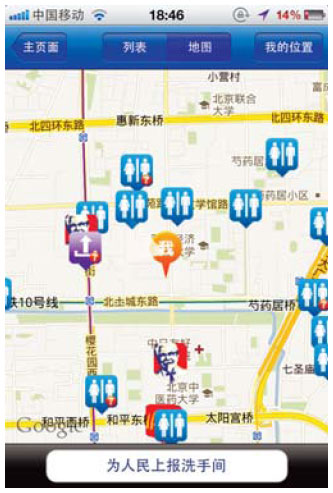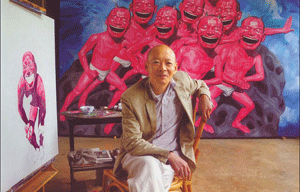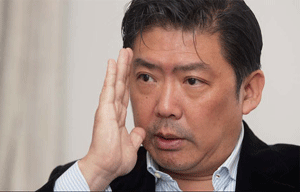Phone app helps you answer nature's call
Updated: 2011-10-15 07:24
By Wu Yiyao (China Daily)
|
|||||||||

SHANGHAI - As anyone who has been through a Chinese-style gathering with endless toasts knows, the call of nature won't wait.
And now you may not have to hang on so long.
A group of smart-phone application developers in Nanjing, Jiangsu province, has developed a nifty GPS program that locates the closest toilet in more than 20 cities around the country.
Huang Li, one of the developers, said it was inspired by a common "need" that is so often shared by many in the most inconvenient moments.
Some five months after the launch of Ohbaba - which literally means "poop" - more than 200,000 users have downloaded the application across China.
Compared to its overseas counterparts such as MizPee, street corners and trees were excluded.
Some of the data about toilet locations are from map-making firms, and others come from Qian and her colleagues' fieldwork.
"We tried some public toilets - some are really hidden gems - they are clean and tidy, but they are on some street corners that people would not notice when they pass by," said Qian.
The team also researched people's preferences for a loo when the need is not so urgent.
Their finding is, not surprisingly, that the most popular toilets are in fast food chains and some coffee houses.
"The facilities and management of most public toilets are not very good, to be honest. Bathrooms in fast food chains are safer places to go," said Michael Grundon, a tourist from the United States.
Smells, slippery floors and suspicious objects in the toilets are the major problems for most public bathroom users in China, said Grundon.
Qian said that's why a rating and review system is extremely important for Ohbaba users.
"This is a palace - it's so clean that you'd be nervous to go," a review for one public toilet in Zhabei district in Shanghai says. "It's awful, don't come! Find a street corner, a lamp post, or anything but not this toilet!" another review for a toilet in Changsha, Hunan province, reads.
Qi Fang, a janitor in a public bathroom in Shanghai said she did not know about the toilet review.
When showed a review saying that the toilet she maintains was "a nice place", the janitor said it was a nice compliment that made her quite happy.
"If possible I hope the mobile phone can tell users that we work hard and please flush after using the cubicles," she said.
To make the bathroom experience more interesting, Ohbaba has now added a virtual doodle board and free jokes for bored squatters. If users find a bathroom that is not included in the database, they can report and establish a new item, "for the benefit of people", as the Ohbaba website encourages.
Since the application is free, the question for developers is how to make a profit.
Cooperating with advertisers can be an option but not very realistic, as it may take a long time while the revenue can be limited, said Xiang Ligang, a Beijing-based telecom professional and communication observer.
"Sometimes giving up the idea of free service and charging users while providing higher quality service can be a better solution," Xiang said.
China Daily
(China Daily 10/15/2011 page1)









